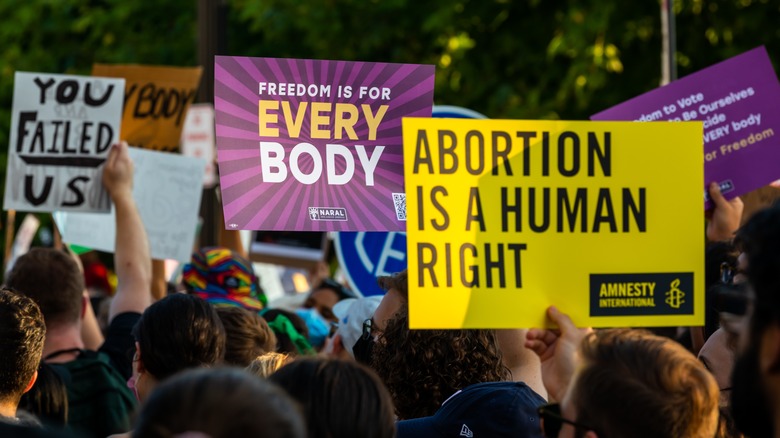How New State Abortion Laws Are Affecting Pregnant People With Cancer
The abortion argument seems simple: you're either for it or against it. What may be seen as a "simple" political win, however, is having real-life consequences that can cost people their lives. For Karen E. Knudsen, MBA, Ph.D., CEO of the American Cancer Society (ACS), when it comes to cancer treatment and pregnant people, the laws aren't clear enough. She told Healthline that cancer care is no longer a two-way discussion between patient and provider; now, the government is involved.
Even before the Dobbs v. Jackson Health Organization ruling back in June, healthcare providers have been fighting with states about clarifying the language of these laws. In Georgia, healthcare providers have been arguing that the state's six-week abortion ban doesn't leave room for providers to still act in time to save the life of the pregnant person, per WABE. Dr. Martina Badell, the director of Emory Perinatal Centers in Atlanta, told WABE there's too much ambiguity around what counts as a "life-saving" measure — especially when so much is on the line for the patient and the provider.
According to the ACS, "up to 1 in 1,000" pregnant people are diagnosed with cancer in the United States every year. Recent court filings in Ohio show, though, that abortions for pregnant cancer patients are being denied. Many doctors are arguing these abortion bans — despite exceptions in the case of the life of the pregnant person — are destroying their ability to perform lifesaving care for their patients.
The problem with the exception to abortion rules
Many states have banned abortion after six weeks of pregnancy, except in the case of it being a life-saving procedure for the pregnant person. Where that line is, however, is unclear. For medical professionals, the language of the law is too vague. Doctors are facing not just fines if they perform abortions; according to The New Yorker, Texas physicians can be charged with a felony and sentenced to jail time. WABE adds that Texas isn't the only state where doctors face these consequences.
Dr. Lisa Harris, a professor of obstetrics and gynecology at the University of Michigan, about the issue tells ABC News abortion exceptions aren't as straightforward as they sound. "None of this is very nuanced and straightforward." She added that it's "really hard for a one-size-fits-all rule or law to generate what all patients are going to need." The wording of exceptions to laws varies by state, STAT reports; Louisiana, for example, only allows for exceptions in the case of "death or substantial risk of death" or "permanent impairment of a life-sustaining organ." Meanwhile, Idaho permits abortion "to prevent the death of the pregnant woman."
Doctors are desperate for clear rules about what "risk of death" means. A study published by New England Journal of Medicine found that, in Texas, pregnant people have to be on "death's doorstep" before doctors feel comfortable performing an abortion under these exception rules. The risk is too high.
Some cancer treatments aren't safe for pregnancies
Pregnant cancer patients, more often than not, must terminate their pregnancies in order to receive life-saving treatment. According to American Cancer Society, getting patients treatment early is key to stopping the growth and spread of cancer (via Healthline). For many, this means getting surgery. Other patients may require radiation or chemotherapy — all options that require a pregnant person to have an abortion before they can proceed. Unfortunately, even new treatments are a risk for pregnant people since there's been no research on the effects of fetal development.
In some cases, like breast cancer, pregnancy makes a pregnant person's cancer grow faster, per KHN."Pregnancy is a state where you have increased levels of estrogen. It's actually actively at every moment causing cancer to grow more," Dr. Debra Patt, the Executive Vice President of policy and strategic initiatives at Texas Oncology, told KHN. "So I would consider that an emergency."
Court filings in a lawsuit in Ohio, however, show that many pregnant cancer patients are being denied cancer treatment until they're about to travel out of state to get the procedure done. According to Healthline, the added hurdle of out-of-state travel can be a barrier between a patient with quick-growing cancer and life-saving care.
For now, KHN reports many doctors are at the mercy of who employs them and how they interpret their state's abortion laws.
Abortion bans are also complicating fertility preservation
Abortion bans are also stopping young people from preserving their ability to have children if and when their cancer goes into remission. In September, American Cancer Society issued a press release warning about the potential effects the Dobbs v. Jackson Health Organization ruling could have on cancer patients who wanted to preserve their ability to procreate.
As Karen E. Knudsen, MBA, Ph.D., CEO of the American Cancer Society, explained to Healthline, the best chance a cancer patient has at successful fertility preservation is to do in-vitro fertilization and then freeze the embryo until the patient is ready to get pregnant. "While you can freeze sperm and you can freeze eggs," Knudsen explained, "that has a much lower chance of actually preserving someone's fertility."
Dr. Sunita Nasta, a professor of clinical medicine at the Abramson Cancer Center at the University of Pennsylvania, told ABC News that having to travel to a different state to get access to fertility care "will put undue burden especially on the most vulnerable patients — medical, financial, and psychological." Plus, a delay in care — even if by a few days — can be life or death for cancer patients. In addition, patients may not have time (or money) to travel outside of their state, which may not only cost them their ability to have children — it may cost patients their lives.



